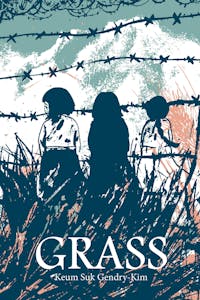Grass
 Download image
Download image
ISBN10: 1770463623
ISBN13: 9781770463622
Paperback
480 Pages
$29.95
Nominated for the Eisner Award for Best Reality-Based Work
Grass is a powerful antiwar graphic novel, telling the life story of a Korean girl named Okseon Lee who was forced into sexual slavery for the Japanese Imperial Army during the Second World War—a disputed chapter in twentieth-century Asian history.
Beginning in Lee’s childhood, Grass shows the lead-up to the war from a child’s vulnerable perspective, detailing how one person experienced the Japanese occupation and the widespread suffering it entailed for ordinary Koreans. Keum Suk Gendry-Kim emphasizes Lee’s strength in overcoming the many forms of adversity she experienced. Grass is painted in a black ink that flows with lavish details of the beautiful fields and farmland of Korea and uses heavy brushwork on the somber interiors of Lee’s memories.
The cartoonist Gendry-Kim’s interviews with Lee become an integral part of Grass, forming the heart and architecture of this powerful nonfiction graphic novel and offering a holistic view of how Lee’s wartime suffering changed her. Grass is a landmark graphic novel that makes personal the desperate cost of war and the importance of peace.
Reviews
Praise for Grass
“Gendry-Kim’s forceful art, with its wild lines and dense black, plunges fully into the realm of nightmare. We see the men in silhouette, each face just a pair of leering eyes and a set of demonic teeth . . . The next two pages are as heart-stopping as any comics I’ve seen. They depict nothing less than the death of a soul.”—The New York Times Book Review
"With an array of visual techniques, from rough smudges to detailed strokes, some fluid and others startling, Keum Suk Gendry-Kim's Grass challenges readers to think critically about their own responsibility as they absorb former 'comfort woman' Lee Ok-sun's story. What is our role as readers in relation to this story? How should we approach inevitable gaps in memory and failures of our own knowledge and imagination? What are the ethics in (re)telling their narratives? These questions, manifested through the aforementioned deft craftsmanship and the portrayal of the artist interviewing Lee, serve to ultimately prove one of the most powerful qualities of art and literature: to act as a portal through which we test and expand our empathy."—Emily Yoon, A Cruelty Special to Our Species, Ordinary Misfortunes
"A small girl on a large, empty page. Alone in a cruel uncaring world. A world at war. Grass is heartbreaking and beautiful. Recurring images of nature, at once delicate and strong, help you to breathe while you choke up from the brutality. Repetition of sky, trees, birds, grass, youth, hunger, old age, and friendship. War must end. Then tears and strength and heroism. Loss but also hope."—Miriam Katin, Letting Go, We Are On Our Own

